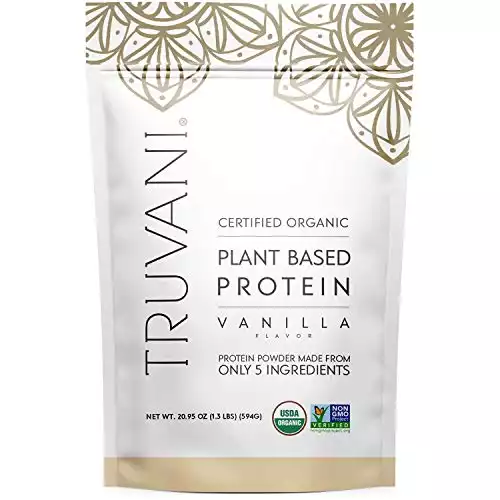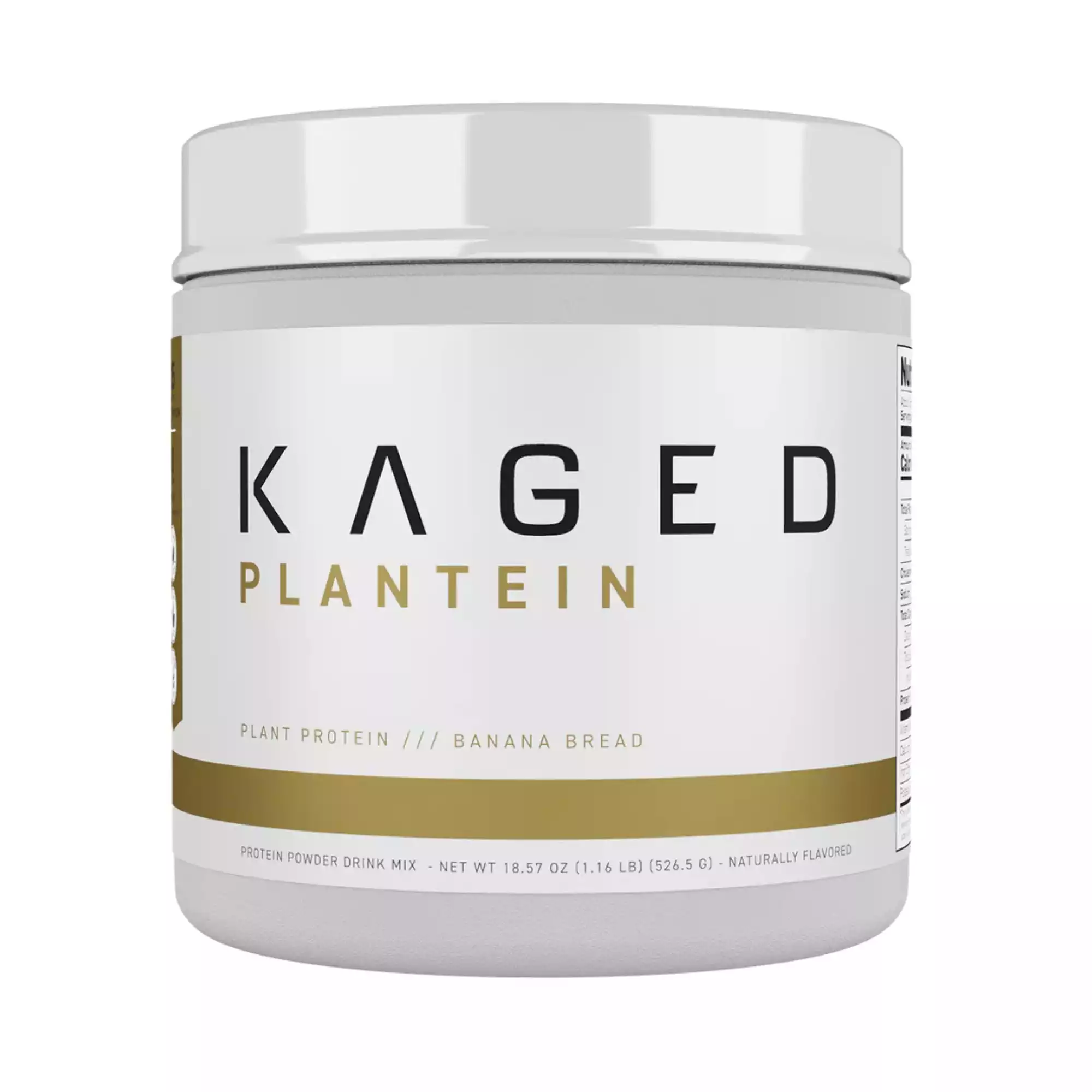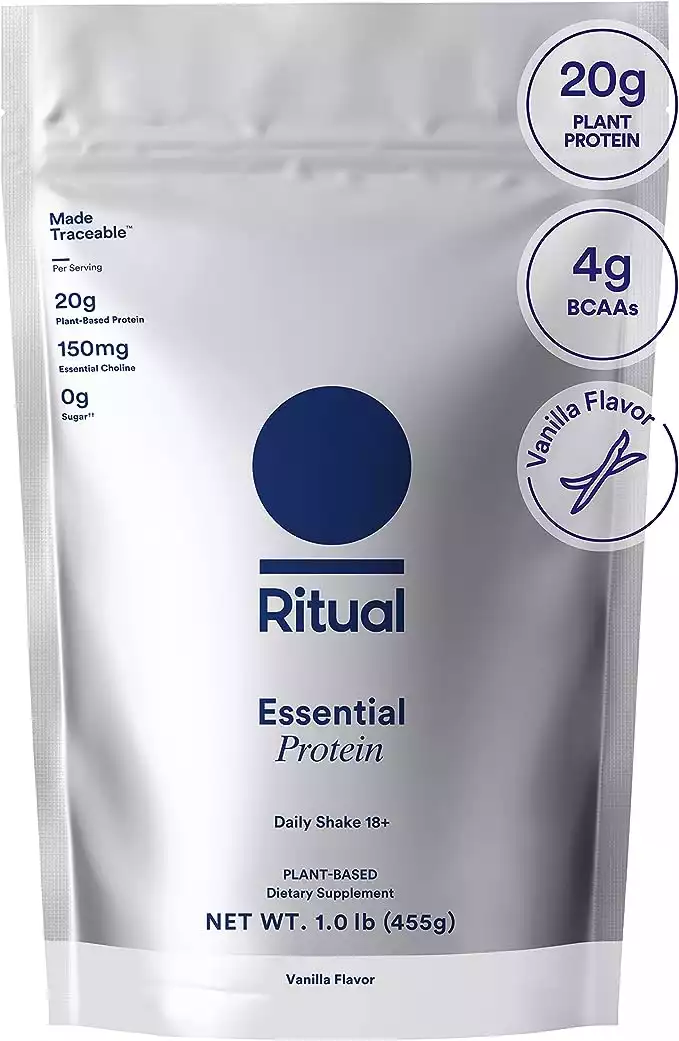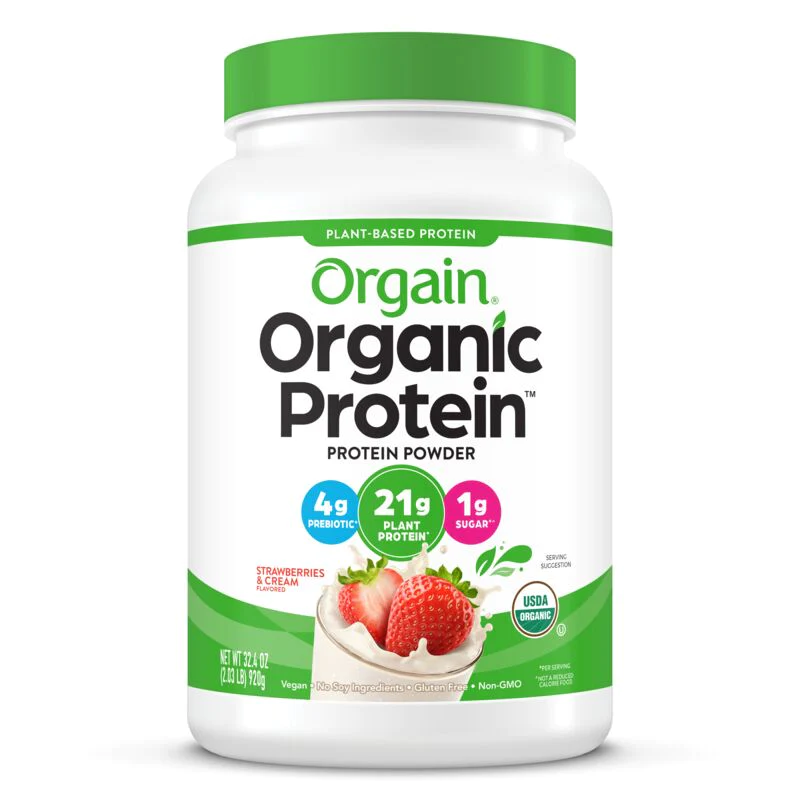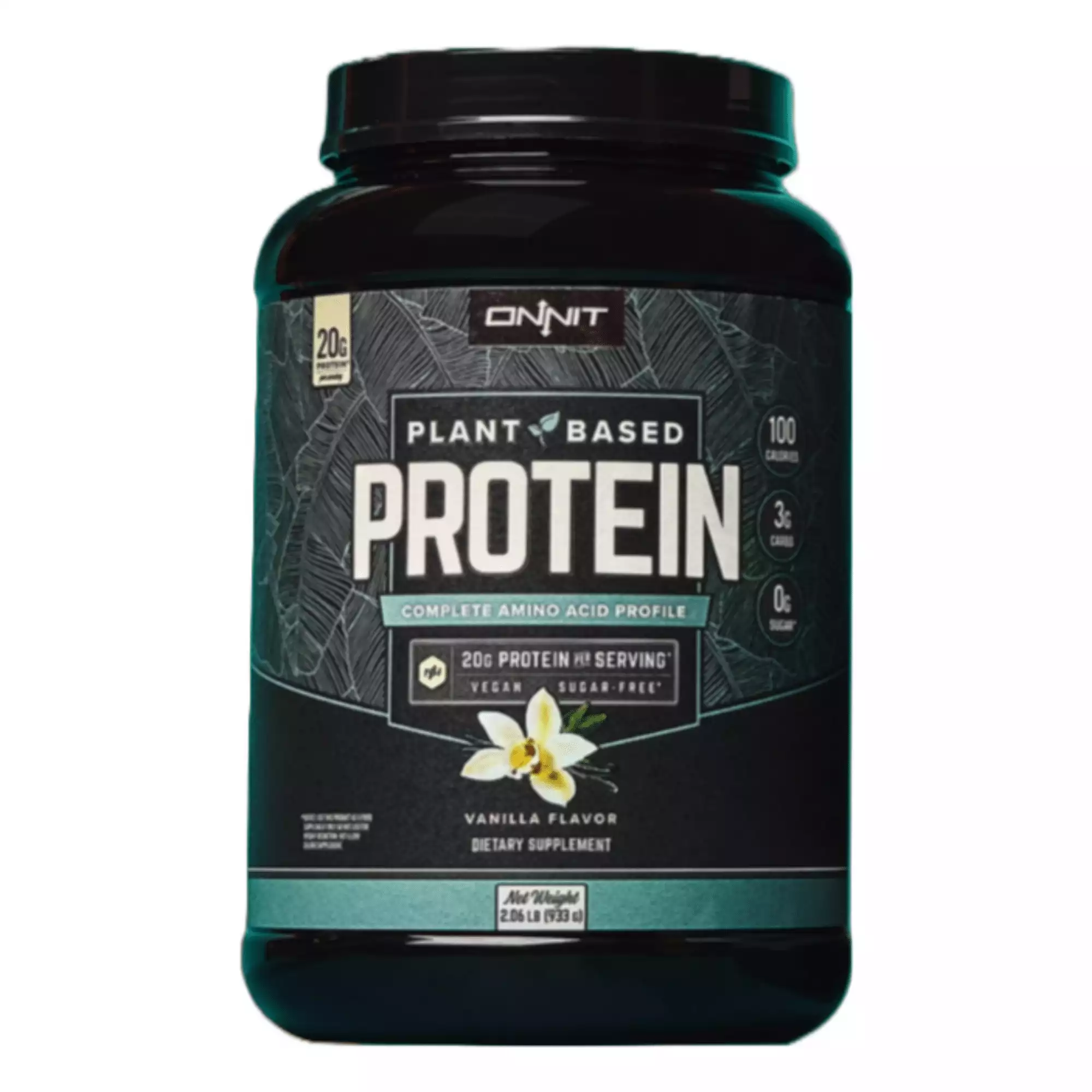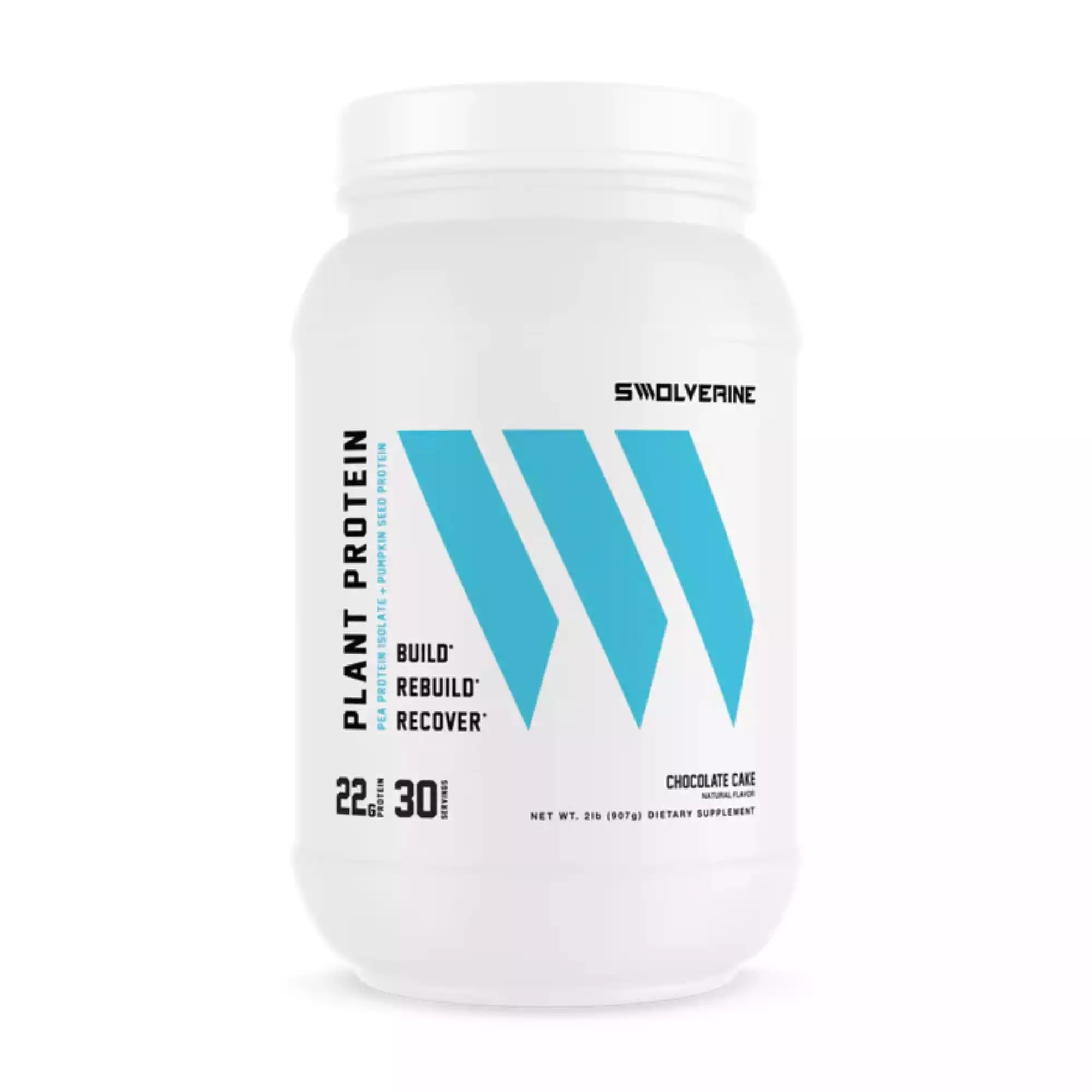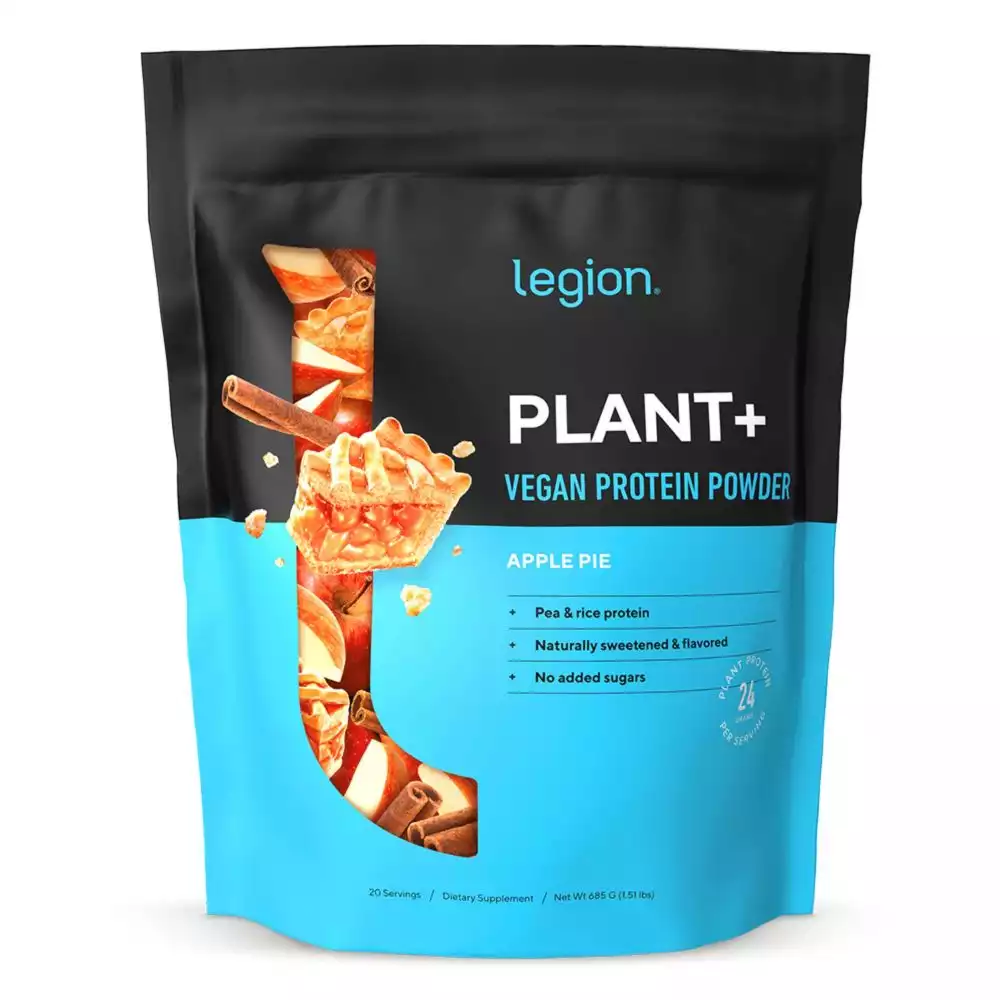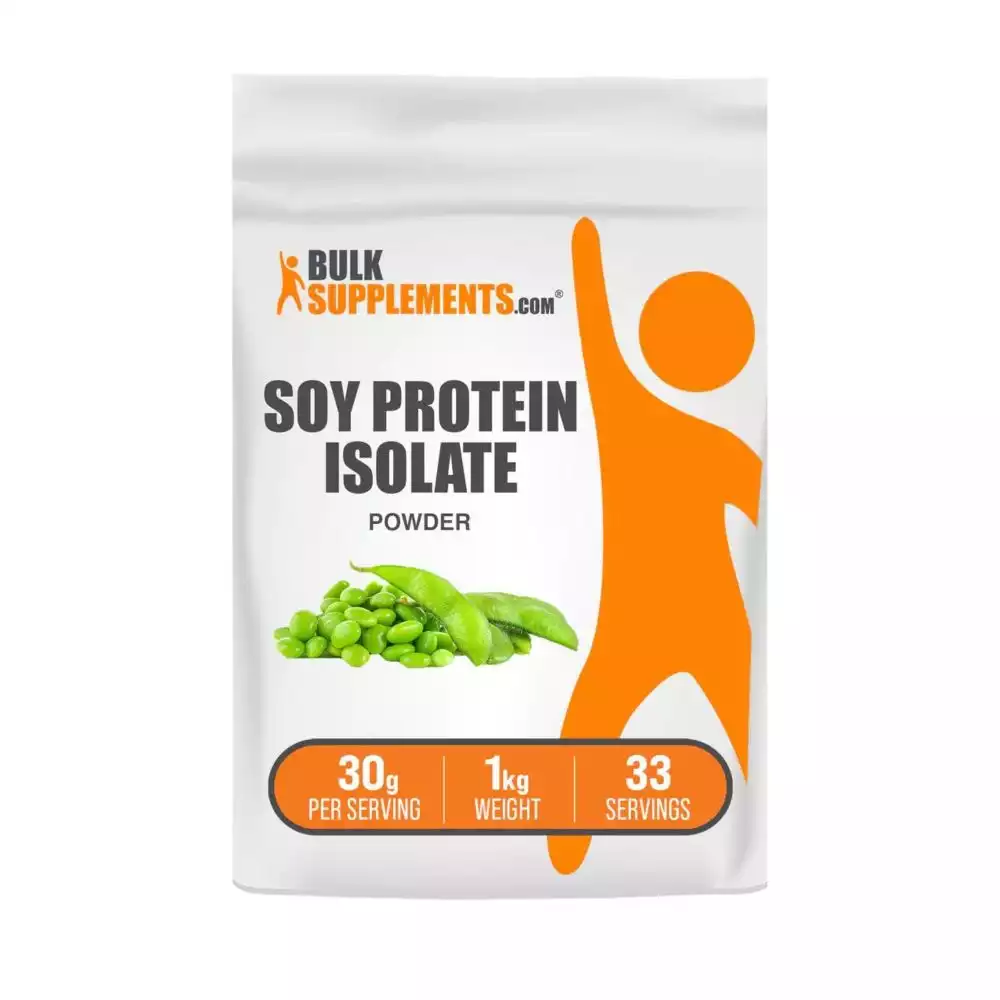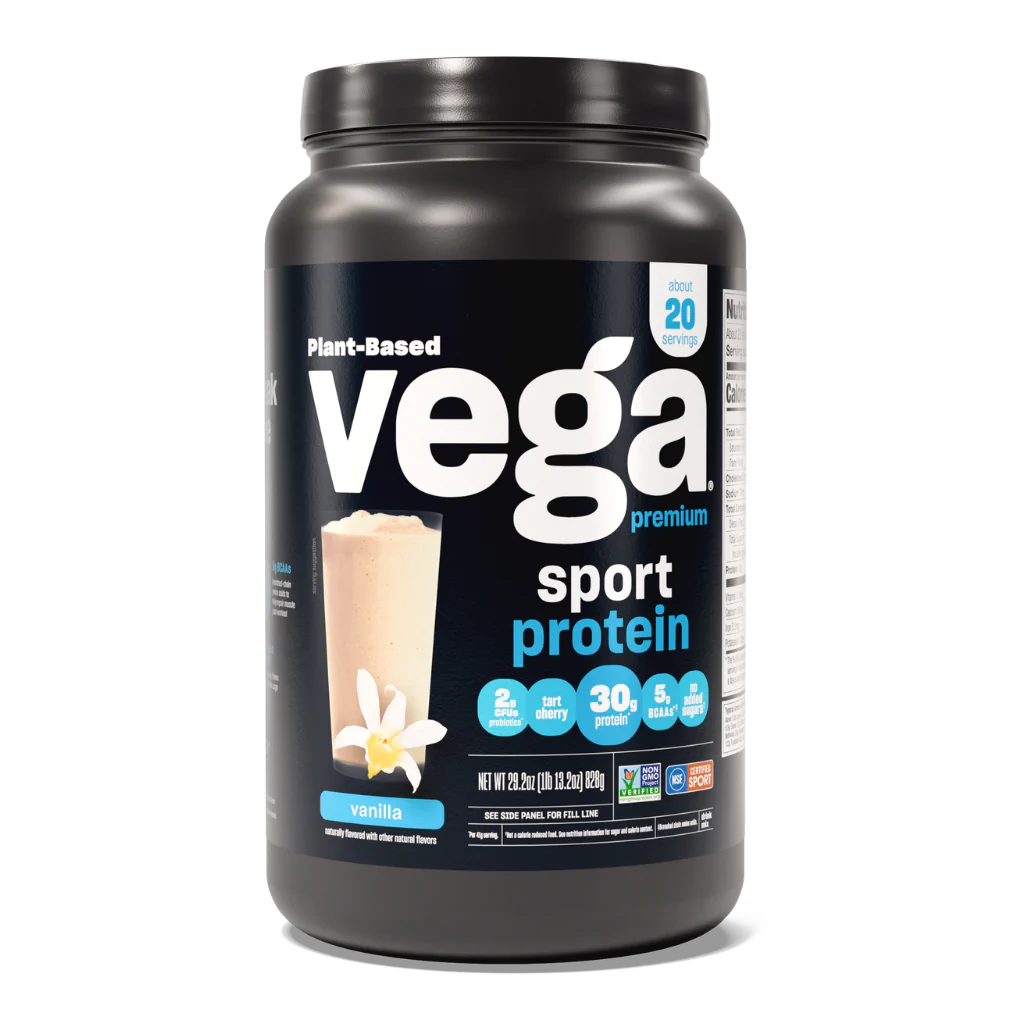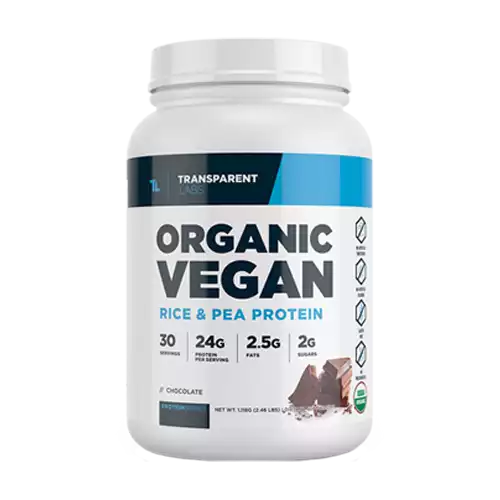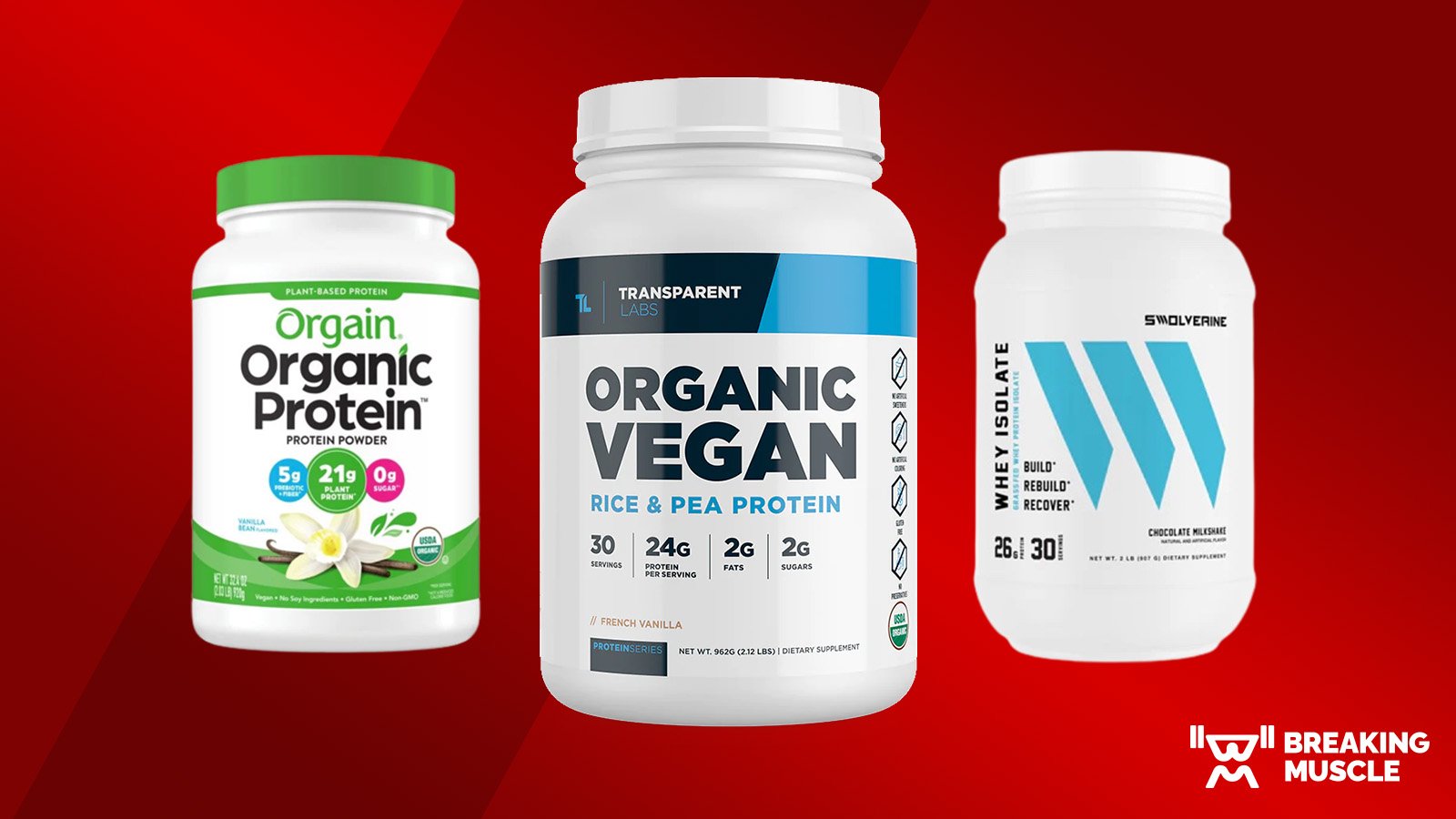
Hey vegans, we have not forgotten about you! We understand that protein powder is generally geared towards whey users. However, there are plenty of plant-based options out there. Plant-based eating has been strongly correlated with reducing heart-related medical concerns, improving your glycemic control, and boosting your gut health.
As a registered dietitian nutritionist with nine years of nutrition-related experience, I have been asked about vegan-friendly dietary supplements many times by clients. To make sure you get research-backed information when it comes to plant-based supplements, I want to share my recommendations with you on the best vegan protein powders available. I also want to encourage those who are not on a vegan diet to try these products out too. Following a plant-based diet is worth the hype it has been getting over the past few years.
Medical disclaimer: This article is intended for educational and informational purposes only. It is not intended as a substitute for medical advice. For health advice, contact a licensed healthcare provider.
How We Chose the Best Vegan Protein Powder
Because your Google search for the best protein powder supplement will flood your computer screen with hundreds of options, Breaking Muscle aims to consolidate those results and deliver a comprehensive go-to guide. We’re not pulling these dietary supplements out of a hat. We research them to make sure they may actually support your nutrition goals. Our team members have also tested over 75 protein powders, including more than a dozen plant-based protein powders.
During our testing and research process, we check out the following to make sure you get the best of what the market has to offer: affordability, taste, side effects, mixability, third-party testing, and ingredient formulation. Our team then uses a scoring system to deliver our top picks. We have you covered for powders that may support muscle gain, weight loss, and bodybuilding. For those who are more focused on dietary restrictions and taste, we also have options for the best-tasting, vanilla, chocolate, unflavored, and gluten-free vegan protein powders.
Our Top Picks for the Best Vegan Protein Powder
Best Vegan Protein Powder Overall: Transparent Labs Rice & Pea Protein Powder
Pros
- No artificial coloring, artificial preservatives, or artificial sweeteners
- No genetically modified organisms (GMOs)
- Gluten-free and soy-free
Cons
- Artificial vanilla taste, possibly due to the use of plant-based stevia
A truly natural vegan protein powder, the Transparent Labs Rice & Pea Protein Powder gets our vote for best overall. It’s also our pick for the best pea protein powder for several reasons. Transparent Labs prides themselves on delivering products without all of the “artificial junk” that may be present in other protein powders. You won’t have to worry about unnatural flavors, artificial coloring, GMOs, or preservatives. This product is also gluten-free, making it a great option for those with gluten intolerance and/or celiac disease.
We give the price per serving a 3.5 out of 5 stars since this protein powder is pretty average when it comes to affordability. The current cost per serving is $1.67, making it one of the more reasonably priced powders on our list.
Transparent Labs Organic Pea Protein gets a solid 4 out of 5 stars from our product testing team for its formulation. There are only five all-natural ingredients listed on its nutrition facts label: organic rice protein, organic pea protein isolate, natural flavor, Himalayan rock salt, and stevia.
My favorite part is that you can pronounce the ingredients, reinforcing the “all-natural” bit. Depending on which flavor you choose, the amount of calories, carbohydrates, and fats will vary slightly. The Chocolate flavor has 150 calories, seven grams of carbs, and 2.5 grams of fat. The French Vanilla flavor has 130 calories, two grams of fat, and three grams of carbs. The amount of protein per serving remains the same at a solid 24 grams.
Since Transparent Labs Rice & Pea Protein Powder contains all-natural ingredients, some users report the smell as pungent. The odor, therefore, influences the flavor and can make the taste very artificial when mixed with just plain water. This seems to be the repeating pattern for those who supplement with the French Vanilla flavor, including our product tester. She only gave it 2 out of 5 stars. However, everyone raves about the Chocolate flavor in online reviews.
Both flavors blend well, leaving no clumps behind. Users have been adding it to pancake mix, almond milk, and protein smoothie bowls without issue. We noticed a slightly gritty texture and gave solubility 3.75 stars, but it wasn’t too off-putting. Our product tester also noted that it upset her stomach a little, but other customer reviews report no side effects. Transparent Labs Rice & Pea Protein Powder has 4.2 stars out of 5 on the company’s website, with 257 reviews at the time of this writing.
Best Tasting Vegan Protein Powder: Truvani Organic Vegan Protein Powder
Truvani Organic Vegan Protein Powder
4.0
- Number of servings: 20
- Cost per serving: $2.50
- Calories per serving: 130
- Protein per serving: 20 grams
- Flavors: Banana Cinnamon, Chocolate, Chocolate Peanut Butter, Matcha, Peanut Butter, Pumpkin Spice, Unflavored, Vanilla, Vanilla Chai
- Third-party tested: Certified USDA Organic, Non-GMO Project Verified, Certified Gluten-Free, Certified Vegan, heavy metal tested
Pros
- Made with only five ingredients
- Manufactured without added sugars
- Free from gluten, dairy, soy, gums, stevia, artificial flavoring
Cons
- Many product users report gastrointestinal discomfort after use — particularly gas
- Reviewers report a gritty texture despite how much they try and blend this powder with various beverages
There is a lot of bias about finding a vegan protein powder that tastes good. Many people are under the impression that vegan products will taste like vegetables or be bland. That is far from the case for our top pick for best-tasting protein powder: Truvani Organic Vegan Protein Powder.
Truvani holds one of the highest number of ratings I have seen on Amazon for protein powders. Out of more than 16,060 reviews, the product holds 4.3 out of 5 stars. Many users admit to being repeat customers and have never been disappointed with the flavor options. The most popular flavor is chocolate. I lost count of the number of users who said it has a rich, creamy chocolate taste that reminds them of a milkshake or dessert.
Many customers add this protein powder to oatmeal and protein shakes. Some interesting combos are the Chocolate flavor in banana bread, oat milk mixed with peanut butter spread and the Peanut Butter flavor, and Banana Cinnamon in pancake batter. If you want to get creative about more ways to incorporate the Truvani Organic Vegan Protein Powder into your daily routine, check out their website for access to free recipes and complimentary e-cookbooks.
We are big on providing honest reviews here at Breaking Muscle, so I want to admit that we give the price per serving 1 out of 5 stars. It is admittedly one of the more expensive protein powders we have reviewed. For comparison, Truvani Organic Vegan Protein Powder is $2.50 a serving, while Bulk Supplements Soy Protein Isolate is only 73 cents per serving. However, there is a hassle-free 30-day “Love Our Product” guarantee that enables you to get a refund if you are not totally satisfied.
Best Vegan Protein Powder for Muscle Gain: Kaged Plantein
Kaged Plantein
4.6
- Number of servings: 15
- Cost per serving: $2.00
- Calories per serving: 150
- Protein per serving: 25 grams
- Flavors: Banana Bread, Cinnamon Roll
- Third-party tested: Informed Sport, Micropure Quality Guarantee
Pros
- Provides you with 30 percent of your recommended daily value of iron per serving
- Complete essential amino acid profile (including 2.1 grams of leucine)
- Non-GMO and gluten-free
Cons
- Sweetened with sucralose — users report a touch of artificial sweetness
The claim that you can not build muscle while eating plant-based is simply not true. As a registered dietitian, I have worked with several vegetarian and vegan clients who are very physically active and gain muscle with ease. This is achievable with vegan protein powders like Kaged Plantein, which delivers 25 grams of pea protein per serving, along with 4.5 grams of high-quality branched-chain amino acids and all nine essential amino acids.
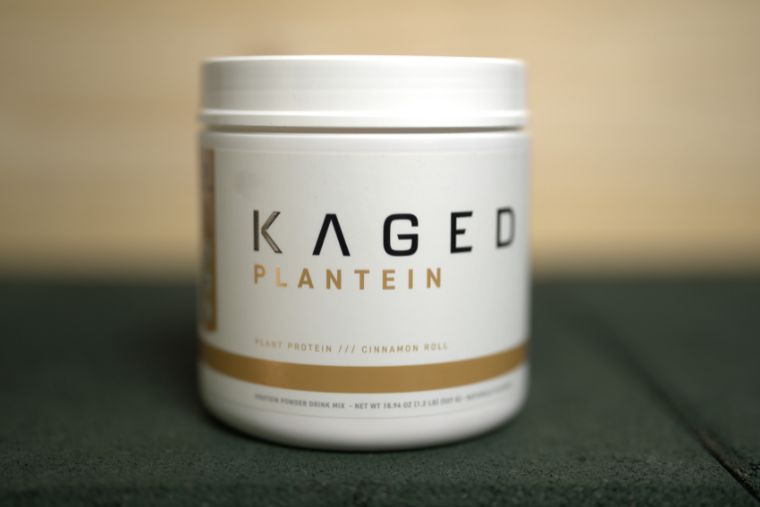
There are three branched-chain amino acids: leucine, isoleucine, and valine. BCAAS have been positively linked to decreasing recovery time after working out by mitigating muscle soreness and aiding in the repair of muscle tissue damage that routinely occurs during exercise. Leucine specifically has come under the microscope because of its potential effects on achieving desired weight goals and improving lean body mass composition (1)(2)
Our product testing team gave Kaged Plantein 5 out of 5 stars for its formulation. It has 150 calories, which is slightly higher than other vegan protein powders we’ve tried but still a standard amount. It also has two grams of carbs and four grams of fat.
Our tester appreciated that this low-carb vegan protein powder offers atypical flavor options like Banana Bread and Cinnamon Roll instead of the usual chocolate or vanilla offerings. These flavor options make mixing Kaged Plantein into baked goods all the more appealing. Who doesn’t want high-protein cinnamon rolls for breakfast?
Our team and online reviewers also agree that this product blends well. We had no complaints about its dissolvability when we mixed it in a shaker bottle, so we gave it 5 out of 5 stars for solubility.
Best Vegan Protein Powder for Women: Ritual Essential Protein Daily Shake
Ritual Essential Protein Powder
4.4
- Protein type: Pea protein
- Number of servings: 15
- Cost per serving: $2.66
- Calories per serving: 115
- Protein per serving: 20 grams
- Flavors: Vanilla
- Third-party tested: Yes
Pros
- Offers three grams of fiber per scoop
- Made with United States-grown peas
- Made with traceable ingredients
Cons
- Some users have reported a slightly chalky aftertaste
If you are on the hunt for a vegan protein powder that has a shockingly good consistency when blended, tastes great, and is packed with nutrients — look no further. Ritual Daily Shake 18+ scored high nearly across the board with our product review team members. They enjoyed the flavor, consistency, and how well it dissolved. However, great taste and solubility aside, the nutrients in this protein powder are what make it our top choice as the best vegan protein powder for women.
This low-fat and low-carb powder offers 20 grams of protein, 150 milligrams of choline, three grams of iron, and 493 milligrams of l-methionine per serving. Choline is a nutrient that is particularly important for the proper uptake of omega-3 fatty acids. (3) Omega-3 is potentially responsible for improving fertility and pregnancy health, decreasing cognitive concerns like dementia (which are more common for women than men), and improving uterine blood flow. (4)(5)
The addition of methionine is useful due to its essential role in micronutrient pathways — in other words, it plays a huge role in the way we metabolize vitamin B6, vitamin B12, and folate. All three of these nutrients are particularly important for women of childbearing age. They assist in converting food to energy, making healthy red blood cells, and developing the nervous system during pregnancy. (6)
To reap the full nutrient benefits of Ritual Essential Protein Daily Shake, you can supplement with it in many ways. Most reviewers report ease of mixability in water, but you can definitely add this to other ingredients to boost your protein intake more. One of my favorite, most refreshing ways to make a high-protein snack is popsicles. Simply mix the vegan protein powder with pureed fruit, honey, lemon juice, and a pinch of salt, then throw it into pre-made popsicle molds and leave it to chill in the freezer.
Best Organic Vegan Protein Powder: Orgain Organic Protein
Orgain Organic Plant-Based Protein Powder
3.5
- Protein type: Pea protein, brown rice protein, chia seed protein
- Number of servings: 10 to 20
- Cost: $1.23 to $1.69 per serving
- Calories per serving: 140 to 190
- Protein per serving: 21 grams
- Flavors: Chocolate Coconut, Chocolate Caramel Sea Salt, Chocolate Peanut Butter, Cookies ‘n Cream, Creamy Chocolate Fudge, Iced Coffee, Natural Unsweetened, Peanut Butter, Strawberries & Cream, Vanilla Bean
- Third-party tested: No
Pros
- Kosher and vegan-friendly
- Manufactured without the use of soy, dairy, and lactose
- Runs fun seasonal flavors like Peppermint Hot Cocoa
Cons
- Some users report difficulty getting this product to completely dissolve without clumps
- Some users don’t like the gritty mouthfeel when mixed with plain water
Trivia time. Did you know that if a dietary supplement receives the USDA Organic certification, it means that it is also non-GMO? Obtaining this certification is no small feat, and manufacturers have to meet very specific requirements. This third-party verification is also a good way to know you can trust a brand when it comes to ingredient quality. Third-party testing is optional and shows that a company cares.
Orgain Organic Protein is able to label their vegan protein powder as “organic” because it contains a minimum of 95 percent organic ingredients. (7) Its protein blend comprises organic pea, organic brown rice, and organic chia seed. It also has 10 other certified organic ingredients listed on its nutrition label, including organic acacia, organic rosemary extract, and organic high oleic sunflower oil.
On the back of the container, you will notice a label that says “Certified Plant Based.” This means that Orgain Organic Protein has also undergone extra steps to ensure it is free of meat, eggs, and dairy products.
Of 4,812 reviews at the time of this writing, this organic plant-based protein powder holds a 4.5 out of five-star rating on their website. It is difficult to say which flavor option is the most favorite among their online customers, as several reviewers state that you can’t go wrong with any of them. Many people report mixing it into water, almond milk, soy milk, protein shakes, smoothies, and overnight oats.
The few users who rated this protein powder low online report artificial sweetness as the main reason, presumably due to misconceptions about the xanthan gum it contains. However, xanthan gum does not contribute to the product’s sweetness. It is a food additive used to stabilize the protein powder. The powder uses stevia extract as a natural sweetener.
RELATED: Best Organic Protein Powder
Best Vanilla Vegan Protein Powder: Onnit Plant-Based Protein
Onnit Plant-Based Protein
3.9
- Protein type: Pea protein, pumpkin seed protein, sunflower seed protein, watermelon seed protein
- Number of servings: 20
- Cost per serving: $2.25
- Calories per serving: 100
- Protein per serving: 20 grams
- Flavors: Chocolate, Vanilla
- Third-party tested: Yes
Pros
- Vegan and vegetarian-friendly
- Contains the full spectrum of essential amino acids
- Made with the natural sweetener monk fruit extract
Cons
- Reviewers report that they struggle with the gritty texture
The Onnit Plant-based Powder is our top pick for the best vanilla vegan protein powder. It scored highly with our product review team, and users online seem to agree.
This product holds 4.3 out of 5 stars for quality and 4.1 out of 5 stars for value on the Onnit website. Full disclosure, our team gave the price per serving rating 1 out of 5 stars. At around $2.25 per serving, it’s one of the most expensive plant-based protein powders we tried. Other products like Transparent Labs Rice & Pea Protein Powder and Swolverine Plant Protein cost less than $2.200 per serving.
However, we gave it a 4 out of 5 for solubility. Reviewers who rate this product lowly on the Onnit site attribute their low scoring to its chalky texture once mixed. Our review team members noted a faint gritty mouthfeel as well but reported that it blended well overall.
Our Breaking Muscle team and Onnit customers have a positive consensus on the side effects of this vegan protein powder. Most agree that there is no bloating or lingering gut discomfort that is sometimes reported with high-protein supplements.
One of my favorite recipe bases came from an Onnit Plant-based Protein powder reviewer. For a peanut butter cup-flavored drink, blend a scoop of vanilla-flavored protein powder with a scoop of peanut butter, a few ice cubes, and chocolate almond milk.
Best Chocolate Vegan Protein Powder: Onnit Plant-Based Protein
Onnit Plant-Based Protein
3.9
- Protein type: Pea protein, pumpkin seed protein, sunflower seed protein, watermelon seed protein
- Number of servings: 20
- Cost per serving: $2.25
- Calories per serving: 100
- Protein per serving: 20 grams
- Flavors: Chocolate, Vanilla
- Third-party tested: Yes
Pros
- Protein is sourced from unique ingredients
- Offers a subscribe and save feature that gives you 15 percent off
- Manufactured without sugars
Cons
- Some users report struggling with the texture, especially those who routinely supplement with whey protein
Fellow chocolate lovers, we have not forgotten about you. And no, you are not having deja vu. Onnit Plant-based Protein powder is so tasty that it claims the spot for not only the best vanilla protein powder but also the best chocolate vegan protein powder.
For only 110 calories, this protein powder packs a punch with 21 grams of protein for every 33.8-gram scoop. It is also low in carbs and fat, with three grams and 1.5 grams, respectively. The protein amount comes from a combination of pea protein concentrate, pumpkin seed protein powder, sunflower seed protein powder, and watermelon seed protein powder. At this time, it has a rating of 4.2 out of 5 stars on Onnit’s website.
Customers report really loving the chocolate flavoring Onnit Plant-based Protein offers. They claim it is not overly sweet and has a rich taste. Our product tester also tried the Mexican Chocolate flavor and noted that it really did taste more unique than other chocolate protein powders she’s tried. She even said that it tasted like a dairy-free chocolate milkshake and rated it 4 out of 5 stars.
To nutritionally fortify your favorite desserts, try adding a scoop of this chocolate vegan protein powder to no-bake cheesecake bites, oatmeal protein balls, dark chocolate chip cookies, or frozen yogurt strawberry bark.
Best Vegan Protein Powder for Weight Loss: Swolverine Plant Protein
Swolverine Plant Protein
4.4
- Number of servings: 30
- Cost per serving: $1.77
- Calories per serving: 130
- Protein per serving: 22 grams
- Flavors: Chocolate Cake, Salted Caramel
- Third-party tested: Lief and Micro Quality labs – an ISO/IEC 17025 accredited laboratory
Pros
- Made with a protein blend of pea isolate and pumpkin
- Decent source of electrolytes for preventing dehydration post-workout
- Many reviewers report that it is easy on the stomach
Cons
- Limited flavors — only Salted Caramel available at the time of this writing
- Many product buyers report very slow shipping — usually longer than two weeks
We give Swolverine Plant Protein 5 out of 5 stars for its low-carb, low-fat, and low-calorie vegan formula. It wasn’t a competition when deciding which vegan protein powder should be crowned the best for weight loss.
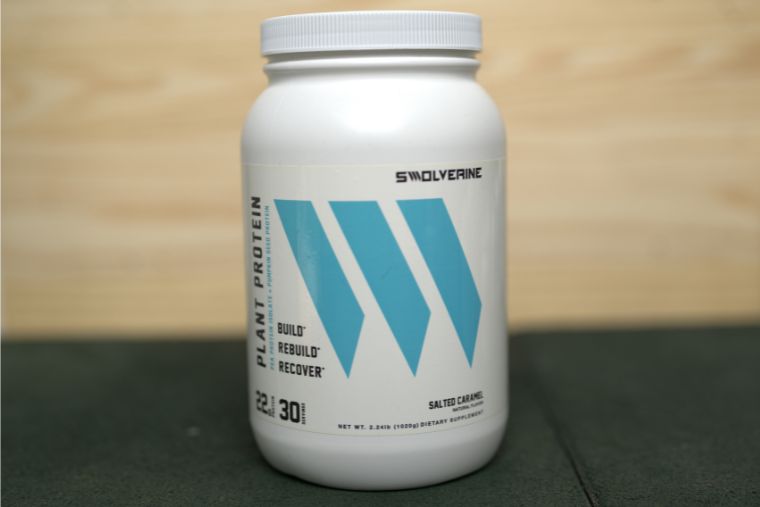
Swolverine Plant Protein contains 22 grams of pea protein isolate and 7.7 grams of pumpkin protein. Although the number of actual ratings is low on their website — only 44 reviews total — they are still crushing it with 98 percent of reviewers giving them 5 out of 5 stars.
Based on our testing experience, it blends well with a simple shaker bottle and water. While it was slightly grainy, it didn’t leave large clumps behind after blending.
It also tastes fantastic. Our team tried the Salted Caramel flavor and we have to say, it actually tastes like salted caramel. Many reviewers online also report mixing it with bananas and oatmeal, making high-protein peanut butter sandwiches with the Chocolate flavor (which is out of stock as of this writing), and blending it with plain ole oat milk.
Since this protein powder has a manageable amount of calories (130), total fat (2.5 grams), and total carbohydrates (three grams) per scoop, it can easily fit into your weight loss plan. Check out the “Macronutrients” heading below for a more detailed explanation of how to calculate your daily calorie and macronutrient needs.
RELATED: Best Supplements for Weight Loss
Best Vegan Protein Powder for Bodybuilding: Legion Plant+
Legion Plant+
3.9
- Number of servings: 20
- Cost per serving: $2.50
- Calories per serving: 140
- Protein per serving: 24 grams
- Flavors: Apple Pie, Cinnamon Cereal, Dutch Chocolate, French Vanilla, Mocha Cappuccino
- Third-party tested: Labdoor Tested for Sport
Pros
- Good source of calcium, providing 225 milligrams per scoop
- Made with 100 percent natural ingredients
- Dairy-free, soy-free, sugar-free, GMO-free, and gluten-free
Cons
- Many report difficulty with blending this product in plain water
Bodybuilding with vegan protein powder? If you nourish your body appropriately, plant-based proteins can absolutely assist you in bulking muscle mass and increasing strength. From a hearty dose of electrolytes to a high protein content, the Legion Plant+ vegan protein powder is our top choice for a bodybuilding supplement.
To prevent dehydration and muscle cramps, Legion Plant+ offers 590 milligrams of sodium and 225 milligrams of calcium. Both of these minerals can be classified as electrolytes, and research supports their use during and after workouts to help maintain a good fluid status.
Scientists have found that our bodies have a greater response to self-regulating fluid during high-volume, moderate-intensity exercises (like bulking with bodybuilding) when compared to low-volume, high-intensity training. (8) This means that your body is more likely to use the electrolytes found in Legion Plant+ in an appropriate way to keep you hydrated when training at a moderate intensity.
Of 1,162 verified purchase reviews, Legion’s vegan protein powder has 4.42 out of 5 stars. Customers especially enjoy the array of flavors, which they find unique and tasty.
Best Unflavored Vegan Protein Powder: Bulk Supplements Soy Protein Isolate
Pros
- Made without additives
- Lactose- and gluten-free
- Solid source of branched-chain amino acids (BCAAs)
Cons
- Some users experience difficulty with the packaging since it is in a bag versus a container like most protein powders
You would be surprised at how often I am asked for unflavored protein powder recommendations. Plant-based protein powders are notorious for their plant-like flavored aftertastes. Many companies add sweeteners to mask the protein’s flavor, but then users report that these products taste either too sweet or too artificial. To keep things simple, Bulk Supplements Soy Protein Isolate consists of only one ingredient: soy protein isolate.
I have read thousands of nutrition facts labels by now, and Bulk Supplement’s vegan protein powder is one of the most interesting ones I have looked over. In one 30-gram serving, you will get 27 grams of protein, 110 calories, zero grams of fat, zero grams of carbohydrates, and 220 milligrams of sodium — all from isolated soy protein.
This specific type of protein introduces you to varying amounts of 18 amino acids that may assist in boosting your immune system, regulating your metabolism, increasing your muscle strength, building muscle, and keeping you literally standing upright.
There are not a lot of reviews on their website online. However, based on the 58 ratings that are available, this protein powder is 4.7 out of 5 stars. The few reviewers who did not give a perfect 5 out of 5 reported that the flavor was too bitter for their liking. This is likely due to it having no added sugars or artificial sweeteners.
That said, several people stated that routine supplementation helped to improve their digestive tract health by decreasing bloating, promoting more regular bowel movements, and improving muscle mass.
RELATED: Best Collagen Supplements
Best Gluten-Free Vegan Protein Powder: Vega Sport Premium Plant-Based Protein
Vega Sport Premium Plant-Based Protein
4.2
- Protein type: Alfalfa, pea, pumpkin seed, sunflower seed
- Number of servings: 12 to 20
- Cost: $2.22 to $3.55 per serving
- Calories per serving: 170 to 180
- Protein per serving: 30 grams
- Flavors: Berry, Chocolate, Mocha, Peanut Butter, Vanilla
- Third-party tested: NSF Certified for Sport
Pros
- Provides 20 percent (260 milligrams) of the recommended daily value of calcium and 30 percent (5.5 milligrams) of the daily value of iron
- Five grams of BCAAs in every scoop
- Zero grams of added sugars
Cons
- One of the most expensive protein powders we have reviewed
Following a gluten-free diet does not mean you can no longer enjoy food. In fact, there are plenty of gluten-free nutrition products that taste great and nourish your body well. It was easy to choose our top pick for the best gluten-free vegan protein powder to help you live a gluten-free lifestyle: Vega Sport Premium Plant-Based Protein.
Vega is known for delivering third-party tested, high-protein, very nutritious plant-powered protein powders. They have set the bar high with their gluten-free, non-GMO vegan protein powder. Available in five distinct flavors, reviewers are pleased with how well this vegan protein powder blends into baked goods, breakfast cereals, and on-the-go smoothies. Per their website, they meet the expectations of over 95 percent of their verified purchasers.
Many users report that they have bought other plant-based, gluten-free protein powders before but feel like those products fall flat compared to Vega Sport Premium Plant-Based Protein. Like most plant-based protein powders, Vega also manufactures theirs with stevia. Users are pleased with this product not having a strong artificially sweet taste and not tasting like a plant by-product.
Customers report purchasing the mocha and vanilla flavor options. However, all of the flavor options available are reported to blend excellently into coffee, gluten-free bread products, and yogurt-based protein bowls.
RELATED: Best Protein Powders for Muscle Gain
Benefits of Vegan Protein Powder
Plant-based protein powder is packed with nutrients that are beneficial to your overall health and well-being. A few of the specific benefits vegan protein powder has to offer are:
- Potential protective factors from major illnesses, such as heart disease, anemia, diabetes, poor bone density, and kidney disease
- The ability to help you increase overall protein intake, which is especially useful for sports nutrition
- Improved muscle mass and strength
- Delayed onset of fatigue post-workout
- Enhanced performance from better endurance
Potential Side Effects of Vegan Protein Powder
The most common side effect of any protein powder is gastrointestinal (GI) tract discomfort. This can come in the form of gas, bloating, loose bowel movements, or stomach cramps.
Because all dietary supplements come with some amount of risk for upsetting the GI tract, check the label for any ingredients that you know upset your belly. This is especially important if you have any food intolerances or food allergies.
I generally recommend starting any new protein powder off in a small amount. For example, try supplementing with half of the recommended amount for the first two weeks and monitor your symptoms to see if you have any adverse effects.
How Much Vegan Protein Powder Should You Take Every Day?
Protein powders should serve as a supplemental form of nutrition to your daily intake of whole-food protein sources and are not recommended as routine meal replacements. Try not to exceed more than a third of your daily protein needs in the form of powder supplementation. If your protein goal is 100 grams a day and you eat three times daily, you can incorporate ~33 grams of powder-derived protein into your diet a day.
Of course, there will always be extenuating circumstances, such as medical concerns like malabsorption, that will require a large volume of protein powder supplementation. If you are ever concerned about the amount of protein powder you are supplementing with, get with a registered dietitian nutritionist (RDN) to help you decipher what is appropriate for your individualized needs to ensure you are getting enough protein.
What To Look For in a Vegan Protein Powder
There are several things to consider when looking into vegan protein powder. Unlike whey protein powder, plant-based protein powders will have varied amounts of macronutrients — particularly carbohydrates — depending on the brand you decide to roll with. They tend to also be pricier than animal-based protein powders, so it’s important to take cost into consideration. Furthermore, third-party testing and certifications are some of the best ways to verify the product’s ingredient quality and integrity.
Macronutrients
There are only three macronutrients — carbohydrates, fats, and protein. Before you determine the macro breakdown of your plant-based protein powder, it’s important to calculate how much of each nutrient to consume in a day.
To do this, break it down into numbers. Aim to get 10 to 35 percent of your total daily calories from protein, 45 to 65 percent from carbohydrates, and 20 to 35 percent from fat.
Since the amount of each macronutrient you need daily is very individualized, I recommend determining your daily calorie goal and calculating percentages for each macro from there. The macro breakdown of your protein powder will then depend on several factors:
- Any medical conditions. For example, those who have chronic kidney disease (and are not on dialysis) will want to aim for a lower protein content. However, those with any kind of wound or individuals healing from surgery will need an increased protein intake.
- Your level of exercise. You will need to adjust your protein and carbohydrate intake to account for how vigorous your workout is. The harder and longer you exercise, the more protein you need to heal those muscle micro-tears. You’ll also need more carbohydrates to restore muscle glycogen (the stored form of energy in the body).
- Overall nutrition goals. The amount of protein you should consume daily will also depend on whether you want to lose body weight, gain muscle mass, or improve your post-workout recovery.
Based on our experience of testing a dozen vegan protein powders, they have between 110 and 150 calories, up to three grams of fat, 20 to 27 grams of protein, and up to 10 grams of carbs per serving. By following the considerations above, you can narrow down your choice to a product with an ideal macro profile for you.
Protein Source
Vegan protein powders should not have whey or casein protein derivatives. However, since they are plant-based, there is a wider array of protein sources when compared to animal-based protein powders.
Whether your product’s protein source is pumpkin seed, green peas, yellow peas, legumes, flaxseed, rice, or soy, the key thing to pay attention to is the amount of protein found in that powder. Since plant-based protein sources are less bioavailable for absorption than animal-derived protein, pick a vegan protein powder with at least 20 grams of protein per serving. This should offer the best support for your daily protein intake goals.
Other Ingredients
Some of us are not shopping for protein powders for the sake of increasing protein intake. In fact, many ingredients can make protein powders special.
For example, those with high cholesterol would benefit from a protein powder with a higher fiber content per serving from ingredients like psyllium husk or monk fruit. Those who may want to lower blood pressure should look for ingredients that contain potassium, such as flaxseed or pumpkin seeds. Products with added digestive enzymes and probiotics are excellent options for improving nutrient digestion and absorption. For immune system support, confirm your supplement choice meets your recommended daily amounts of vitamin C and vitamin E.
Check out the back of the bottle for ingredients other than the source of protein (i.e., gluten, allergens, or artificial sweeteners) if you have a particular health goal in mind. I always encourage clients to individualize their dietary supplements (especially protein powder) to align with their nutrition and wellness goals.
Flavors
I routinely have different flavor options of protein powder on hand because of the way I use protein powder. Self-fortifying products like baked goods, overnight oatmeal, whole grain cereal, and even iced coffee are different ways to incorporate protein powder into your daily routine if you get tired of mixing it with water.
Try and align the vegan protein powder flavor with what you want to add it to. This will ensure that the flavor profiles mesh well. For example, adding an unflavored option to cereal, a banana-flavored option to dark chocolate chip muffins, or a vanilla-flavored option to coffee will all work well. If you find the repetitive use of protein powder boring, I encourage you to blend it into a different product to increase that particular food or beverage’s nutrient profile to deliver greater health benefits.
Certifications and Third-Party Verification
When it comes to dietary supplements, you will need to be somewhat of a detective. Since they are not regulated by the Food and Drug Administration (FDA), supplement certifications and third-party verification are super important. These extra testing parameters can provide you with peace of mind regarding your product’s ingredient quality and purity.
Third-party testing certifications like NSF Certified for Sport, USDA Certified Organic, and Informed Sport are all excellent ones to look for on your protein powder container.
Final Thoughts
Vegan protein powders are here to benefit both the vegan and non-vegan populations. The push for plant-based nutrient intake has been ramping up for the past few years — and with good reason. Plant-based eating is strongly correlated with potentially decreasing the risk of developing chronic illness, recuperating quicker after exercise, improving muscle strength, and enhancing sports performance.
If you do not have the time to personally test multiple vegan protein powders, use this review of the best vegan protein powders as a reliable, research-based guide. Our selection process is thorough, as we analyze cost, formulation, flavor, texture, mixability, side effects, and customer service satisfaction. We do not pluck random protein powders off the shelf. The vegan protein powders above made the cut for two main reasons: quality and researched ability to support a variety of nutrition goals.
Best Vegan Protein Powder: Side-by-Side Comparison
Best Vegan Protein Powder
Overall
Best Tasting
VeganProtein Powder
Description:
- Number of servings: 20
- Cost per serving: $2.50
- Calories per serving: 130
- Protein per serving: 20 grams
- Flavors: Banana Cinnamon, Chocolate, Chocolate Peanut Butter, Matcha, Peanut Butter, Pumpkin Spice, Unflavored, Vanilla, Vanilla Chai
- Third-party tested: Certified USDA Organic, Non-GMO Project Verified, Certified Gluten-Free, Certified Vegan, heavy metal tested
Best Vegan Protein Powder
for Muscle Gain
Best Vegan
Protein Powder for Women
Best Organic
Vegan
Protein Powder
Description:
- Protein type: Pea protein, brown rice protein, chia seed protein
- Number of servings: 10 to 20
- Cost: $1.23 to $1.69 per serving
- Calories per serving: 140 to 190
- Protein per serving: 21 grams
- Flavors: Chocolate Coconut, Chocolate Caramel Sea Salt, Chocolate Peanut Butter, Cookies ‘n Cream, Creamy Chocolate Fudge, Iced Coffee, Natural Unsweetened, Peanut Butter, Strawberries & Cream, Vanilla Bean
- Third-party tested: No
Best Vanilla
Vegan
Protein Powder
Best Vegan
Protein Powder
for Weight Loss
Best Vegan Protein Powder for Bodybuilding
Best Unflavored
Vegan
Protein Powder
FAQs
The Kaged Plantein is our top pick for the best vegan protein powder. Not only is it one of the more affordable options currently available, but it also has a solid formulation with regard to macronutrients and micronutrients. Our review staff found its taste and solubility to be unmatched compared to other vegan proteins on the market. We added bonus points because it is also third-party tested.
The Bulk Supplements Soy Protein Isolate protein powder is great for muscle growth. Its addition of branched-chain amino acids (BCAAs) gives it an edge comparatively. BCAAs have been linked to improved post-workout recovery times, greater muscle gains, and enhanced sports performance.
Of the dozen or so plant protein powders we tested, Kaged Plantein was the best. It is the only one that scored a perfect 5 out of 5 stars from our review staff.
A protein powder can only be considered a complete protein source if it contains all 20 amino acids. There are nine amino acids that our body cannot produce by itself, making them “essential.” These essential amino acids are more difficult to come by in vegan-friendly protein powders than animal-derived protein powders. However, Vega Sport Premium Protein Powder is an excellent complete plant-based protein supplement.
If you are on the hunt for a protein powder that has all 20 amino acids, double check the supplement label for the following complete amino acid profile: Leucine, isoleucine, arginine, valine, tyrosine, methionine, phenylalanine, lysine, threonine, glycine, histidine, glutamine, tryptophan, alanine, cysteine, serine, proline, asparagine, aspartic acid, and glutamic acid.
Research
- VanDusseldorp TA, Escobar KA, Johnson KE, et al. Effect of branched-chain amino acid supplementation on recovery following acute eccentric exercise. Nutrients. 2018;10(10):1389. doi: 10.3390/nu10101389
- Komar B, Schwingshackl L, Hoffmann G. Effects of leucine-rich protein supplements on anthropometric parameter and muscle strength in the elderly: A systematic review and meta-analysis. J Nutr Health Aging. 2015;19:437–446. doi: 0.1007/s12603-014-0559-4
- Korsmo HW, Jiang X, Caudill MA. Choline: exploring the growing science on its benefits for moms and babies. Nutrients. 2019;11(8):1823. doi: 10.3390/nu11081823
- Ammann EM, Pottala JV, Robinson JG. Ertyrhocyte omega-3 fatty acids are inversely associated with incident dementia: Secondary analyses of longitudinal data from the Women’s Health Initiative Memory Study (WHIMS). PLEFA. 2017;121:68-75. Doi: 10.1016/j.plefa.2017.06.006
- Lazzarin N, Vaquero E, Exacoustos, et al. Low-dose aspirin and omega-3 fatty acids improve uterine artery blood flow velocity in women with recurrent miscarriage due to impaired uterine perfusion. Fert and Ster. 2009;92(1):296-300. doi: 10.1016/j.fertnstert.2008.05.045
- redruello-requejo m, carretero-krug a, rodríguez-alonso p, et al. dietary intake adequacy and food sources of nutrients involved in the methionine-methylation cycle in women of childbearing age from the anibes spanish population. Nutrients. 2021;13(9):2958. doi: 10.3390/nu13092958
- About Organic Labeling. U.S. Department of Agriculture. https://www.ams.usda.gov/rules-regulations/organic/labeling#what%20requirements. Accessed September 21, 2023.
- Boone CH, Hoffman JR, Gonzalez AM, et al. Changes in plasma aldosterone and electrolytes following high-volume and high-intensity resistance exercise protocols in trained men. Journ of Stren and Cond Res. 2016;30(7):1917-1923. doi: 10.1519/JSC.0000000000001276
Trending Products

